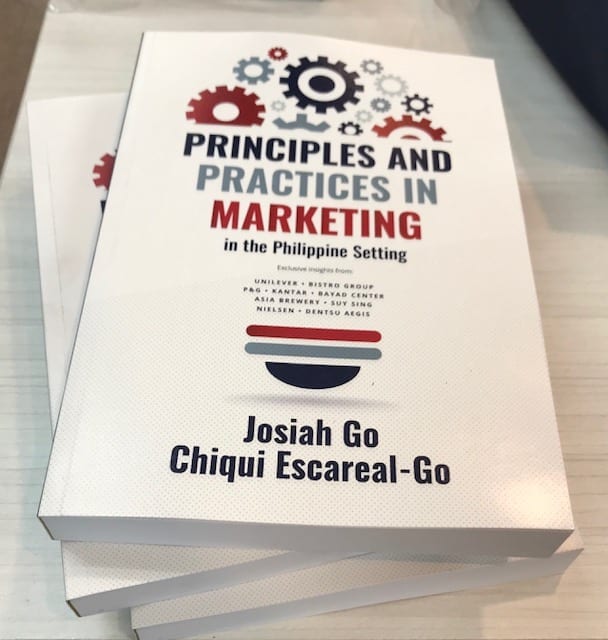
Bestselling sales author Emilio Macasaet III interviewed Chiqui Escareal-Go and myself during our book launch of ‘Principles and Practices in Marketing in the Philippine Setting’ in National Book Store Glorietta 1. Below is the transcript of the Q&A last Nov. 24, 2017.
Q1 : In your experience, what have been some of the biggest misconceptions about marketing?
Josiah: First, the most common confusion that the function of marketing is simply the satisfaction of consumer needs and wants. Satisfying customers is the role of a product or service in the marketing mix. Marketing is much broader than that and is more than just a product or service. It is only a starting point. The marketing 3Cs composed of consumers (or customers), competition and company tell us marketing is about creating the profitable preferred brand.
Then there is that belief that marketing is ‘manipulation’ to the detriment of the customers. This needs to be corrected because the goal of marketing is to have and build customer relationship. Manipulating customers will result in customer’s remorse that will end instead of build relationships.
Another misconception is that marketing is all about creativity to attract consumer’s attention amidst the clutter. Marketers must remember that financial accountability of the company is as important to the customers choosing your brand over competition.
Q2 : You are an anthropologist, what brought you there and why does marketing need inputs from the social sciences?
Chiqui : I’ve always been interested in understanding people – especially what makes them tick or what makes them do the things they do. Growing up, I think I was extra sensitive to this as a middle child who needed to navigate between my older siblings and the younger ones, while looking for my own space. This self-awareness has influenced how I needed to get things done, being a perfectionist.
As an educator, I knew I had to find ways of teaching how to understand consumers (for better insighting) and how to lead teams for better marketing
implementation. I realized I needed a framework to translate what to me was instinctive, to teach students how to understand consumer behavior and how to find unmet needs and see real pain points that customers themselves might not even know. In marketing, we call this a day in the life of the consumer and one could easily get insights there… or not.
Now, we find more studies being done on behavioral economics, or even the irrational consumer. We find that things are not always what people say they are in FGDs or IDIs. Technology and big data are changing at impossible speeds. Businesses will need to keep up. It used to be that patterns and averages can predict the future but it seems that this is no longer the case. It used to be that all businesses had to do was to be better than competition but how do you fight a competitor who is not visible because it is a small start-up who has nothing to lose by breaking all the rules? How does one see into the future?
Anthropology is the study of people – their evolutionary history, their behavior and how they adapt to the environment, what customs or rituals they follow, how they socialize, what language they use and their true meanings. Aren’t these what marketing also looks into?
I could go on and on but let me give you an example. We all know now that convenience is a real need given traffic conditions and time-starved working people. That will never change as we can see in our evolutionary history. One of the theories why man chose to walk upright (from all fours) is to conserve energy – both in dissipating heat from the body and being able to readily gather fruits from trees for food. So in creating processes including digital sites, one must always prioritize ease of use to save time and energy. What was important to our ancestors when they chose to reach out to the fruits on the tree? Their eyesight – they had to use the sense of sight to see the attractive colors that was worth risking life and limb some times. With this knowledge – how do you direct the sight of the shopper to the links on a digital websites or the shelves with packaging as the silent salesperson? It helps to understand these things on an evolutionary perspective right? I would really like to see how we can use anthropology on wearables.
Other anthro theories that could be used in marketing include power dynamics, social structures like family, kin and society, agency and identity, among others.
Knowledge of certain anthropological theories will help the marketer ask critical questions to either dig deeper or build on top of ideas, and how anthropological tools such as ethnographic research and participant observation using the proper note-taking procedures and sensemaking can help marketers process information for better understanding and better insights.
Q3: While completing your master’s degree in anthropology, you have written this book with Joe while also being president of the Women Business Council of the Philippines for 2016-2018. What are some of the trends in the Philippines involving women?
Chiqui: There are many reports that confirm the strong position of women in Philippine society – as a matter of fact we are the highest ranked Asian country in the Gender Gap Report of the World Economic Forum 2017, where we are ranked top 10 (though down from top 7 last 2016). This reports measures access to health, access to education, economic opportunity and political empowerment. We went down in economic opportunity and health.
What do these things tell us? That while women are better educated and we have more women in political positions – we are unable to translate these two strengths in improving women’s work, compensation and most importantly health.
In recent APEC and ASEAN summits held here in the Philippines, we will find that conversations remain focused on 5 pillars: access to finance, access to market, women leadership, skills and capabilities building and ICT. We recently did a research with APEC and DTI on Women as Prime Movers of Inclusive Business where we found that for inclusive business to happen, government must play a big role in the enabling environment in terms of providing information, financial support, incentives and gender sensitive policies, and for other stakeholders like private institutions to commit to IB. In the ASEAN Inclusive Business Summit I attended, the financial institutions mentioned there is funding available but not enough champions. While the Department of Trade and Industry is working hard to achieve economic goals, I find that for inclusive business to happen, the LGUs and the Academe MUST be a strong or equal part of the enabling environment.
The other area on women leadership that needs attention is women representation in the C-Suite or on Corporate Boards – not just for token gender diversity but for the value (both financial and ethical/moral) women are able to contribute in those positions.
Q4: What are some of the common violations in formulating marketing strategy?
Josiah:
· That campaigns are done without auditing the value proposition.
· That target market is based on demographics without understanding that demographics alone won’t drive behavior.
· That product uniqueness is promoted without conscious understanding of how to create real relevance.
· That differentiation is done tactically by being different in the same way as how competitors compete without knowledge of how to be different in a different way.
· That approaches that worked in the past are repeated without conscious effort to innovate beyond the marketing mix.
· That there is tendency to keep giving more benefits for less price without considering more for more.
· There are many more.
Q5 : Your 14th book ‘The Rainmakers’ last May 2017 broke all-time launch sales record. Why does your latest book ‘Principles and Practices in Marketing in the Philippine Setting’ sound like a back-to-basics marketing book?
Josiah: Thank you for mentioning The Rainmakers. It not only broke all-time launch sales record but remained as a National Bookstore bestseller for months after its launch.
This new book, as you described it, is indeed, a back-to-basics book to review the foundation of marketing practice given many misconceptions and violations in doing marketing. As we have been in the field of marketing education for almost 28 years, we are quite aware of how marketing is perceived, defined, executed in the industry and it is our hope that this book will help strengthen foundations of new and future marketers, preparing them well for their jobs when they enter the workforce. We always say that marketing is not just for the marketing department – but for the whole company. Who knows, maybe with this book, we no longer have to teach Fundamentals of Marketing at Mansmith. We don’t mind making our own programs obsolete – this challenges us to think of something new, something better. We like to walk our talk.
Q6: What are you proudest of in your latest book ‘Principles and Practices in Marketing in the Philippine Setting’?
Chiqui: Simply that we are able to write something for the Filipino youth in an important area such as marketing. We know that businesses will always have a strong marketing component and being able to help young marketers have a solid marketing foundation is truly fulfilling. Since there are many Philippine cases mentioned here, this book can also serve as a historical reference of how brands and marketers behaved amidst challenges and how they succeeded. We also included some activities at the end of each chapter that can hopefully make marketing come alive for the students while making them aware of important issues happening around them. We hope both students and teachers will not only learn together but also enjoy the process.
Q7: What motivates you to keep learning and keep writing? What else do you see happening in marketing education in the coming years?
Josiah: Everyone has to be a life long learner. Marketing research guru Dr. Ned Roberto said it best that knowledge has a short shelf life so I try to have both a breadth of knowledge as well as depth of marketing specialization. Thus, my marketing education journey has led me to be able to view marketing from different lenses, i.e. growth marketing, defense marketing, market-driven strategy versus market-driving strategy, consumer marketing vis-a-vis trade marketing vis-a-vis shopper marketing vis-a-vis retail marketing, marketing mix vis-a-vis business model innovation, marketing strategy formulation vis-a-vis marketing and sales implementstion, marketing analysis versus consumer behavior, digital marketing vis-a-vis influencer marketing … the list is endless.
For education, K12 is like our new college freshmen so we need to help strengthen their foundation early and help them to be marketing-oriented, not just at work but even in their personal lives, after all each person has value to offer. I am focusing a lot of my time nowadays teaching and mentoring some 400-500 K12 marketing teachers for free so they can be more equipped and inspired to teach marketing. The multiplying effect of sharing this knowledge with the academe will help create greater prosperity for the most number in society.
Q8: What are ways to motivate students to take the marketing track? What is there to love about Marketing?
Chiqui: As Joe earlier mentioned, we need to change the mindset that marketing (or advertising) is out there to manipulate consumers to keep buying. The Filipino youth should be guided to seek out real customer needs or pain points so they can provide solutions that can be life-changing or beneficial to the customer. While profit is important to any business entity, the vision-mission should also be cultivated to create a bigger sense of purpose, so that at the end of the young marketer’s day – after plans, budgets or targets are presented or even attained, the young Fililipino marketer knows he was able to do good.
That’s what I love about marketing – it is about people, it is exciting, it is fun, it is unpredictable, it is rewarding and it can make a big difference in things that truly matter.




One thought on “Q&A with Josiah Go & Chiqui Escareal-Go on their new book Principles and Practices in Marketing by Emilio Macasaet”